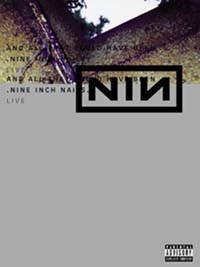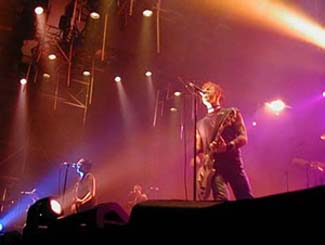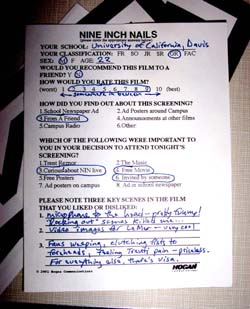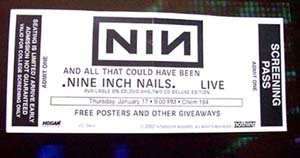|
Trent Reznor keeps doing
his thing, I keep doing mine. I thought Iíd washed my
hands of the whole NIN business by selling off my copy
of The Downward Spiral several years back. Yet,
Trent keeps popping up in my world (strange, since Iím
not really a fan), and I keep not popping up in his (a
small blessing). I went to college a couple miles down
the road from Trentís hometown of Mercer, deep in the
wilds of western Pennsylvania. I rocked some coffee shops
there with my band, and frequented a roadhouse where he
reportedly showed up on occasion to swill beers with the
peasantry. A professor I knew was tight with Reznorís
dad. After graduating, I moved to Lakewood (Cleveland
area), and kicked around the safety-pinned remnants of
the scene where he got his start. I had an argument with
my girlfriend about her going to see NIN with some guy
from the radio station I wasnít real into at the time.
She went. I could go on, but you get the picture. It seems
Trent has popped up once again, following me in spirit
to my new digs in California: I somehow ended up standing
outside a Chem. building on the UC Davis campus, waiting
in line to see a free advance screening of a new NIN film
of some sort.
The screening was a rag-tag
affair, comprised of perhaps eighty Davis students and
an ego-tripping MC, who handed out a few promo cds with
an arbitrariness calculated to foster unrest among those
(including yours truly) who did not receive one. (We were,
however, somewhat mollified with free posters, stickers,
etc. as well as a questionnaire requesting our honest
feelings about the film.) Before the film started, I had
no idea what to expect from itówas it a documentary? An
artsy multimedia side project? Nasty rumors were circulating
about a collaborative effort between Trent and a visual
artist specializing in gruesome and shocking images, the
nature of which I wonít repeat here. Such speculations
proved false, as the opening credits came up for And
All That Could Have Been:NIN Live.
 |
And All That Could Have
Been, in stores January 22 on CD, DVD, VHS, and a
two-CD deluxe edition, is the first live recording from
NIN, featuring performances culled from 2000ís The
Fragility V2 U.S. tour. The product seems poised to
ride the critical acclaim of The Fragile and the
promotion tour Rolling Stone proclaimed best of
the year, although the financial soundness of a follow-up
to a commercially under-achieving album seems somewhat
suspect. But Iíll leave that matter to Reznorís accountant.
Letís get back to the filmÖ Cue
crowd noise. The opening notes of "Terrible Lie"
snarl from the speakers, the lights come up. Reznor, resplendent
in white face paint, scraggly long hair, and a sleeveless
black shirt, chants the spooky lyrics while writhing a
la Alice Cooper, "Welcome to My Nightmare."
The harsh lighting pulses with the beat, the band thrashes
around like rag dolls, the guitars scream and so do the
fans. Trent and his band of Ziggy Stardust/ Blade Runner/
Billy Idol clones proceed to headbang through "Sin,"
"March of the Pigs," and "Piggy" before
they downshift and let you catch your breath with the
appropriately restrained "The Frail."
Youíd think that sharing
a bill with David Bowie, let alone remixing "Iím
Afraid of Americans" would be enough. Youíd think
that Marilyn Mansonís aping of all-things-Ziggy Stardust
for the doomed Mechanical Animals would be sufficient
warning. But no, NIN has to wear its Bowie-fandom on its
sleeve, whether through the guitaristís shamelessly Ziggy
makeup and costume, Reznorís compulsion to insinuate bizarre
alien sex with his band members, or the sheer glammy theatrics
of the whole affair. While itís hard to watch this film
without thinking of Ziggy Stardust: The Motion Picture,
NINís effort lacks the latterís playful self-consciousness.
In Ziggy, the spliced-in dressing-room footage,
Ziggyís "rock and roll suicide," etc. give Bowieís
staginess an endearing vaudeville quality, a self-consciousness,
whereas NINís, without such reflexive moments, just wallows
in its omnipresent heaviness, apparently unaware of its
campy qualities.
And All That Could Have
Been shows some things in rock íní roll havenít changed
much since the early Ď70ís. Fog machines are still considered
cool, I gather from the film. "Dueling guitars,"
string-bending grimaces, and running hands through the
hair in a passionate manner are also apparently still
legit, although I would have guessed them by now the sole
province of geriatric rock spectacles like the Stonesí
Bridges to Babylon stage show. Zepís theremin scene
from The Song Remains the Same is served up move
for move by the good folks in NINótwice. At a couple of
key moments the band gets Who-esque, smashing instruments
and flinging mic stands around, while roadies scurry about
the thankless task of cleaning up after them ("Baba
OíReilly" would have been a great cover for NIN to
play at this point). At one point in the film, something
white flutters down into Reznorís arms from above, and
I thought (hoped) we were in for a reenactment of the
whole biting-head-off-chicken fiasco, but it turned out
to be just a well-aimed piece of trash.
 |
To be fair, the film benefits
from imaginative and well-executed stage lighting, competent
camera work, and mostly seamless editing in spite of the
fact that the film was cobbled together from several concerts.
To their credit, NIN foregoes bombastic Kiss pyrotechnics,
but then again, they use their video screens to show flickering
flames, so perhaps thatís a moot point. They also throw
a lot of water around, for which I have no explanation,
but at least it seems different.
The music? Well, the music
is good, even great. "Closer" and "Head
Like a Hole" never rocked harder. At times the prerecorded
tracks and the live instruments congeal and pack some
solid sonic wallop. In general, a tight band, with focused,
to-the-point performances. The instrumental cuts are particularly
excellent. Iíd definitely consider buying the audio cd
version, if only for its "greatest hits" appeal.
But ultimately the weaknesses of the film stem from the
inherent weaknesses of the music: Reznorís lyrics and
titles read like a dumb suburban teenagerís diary. (Interesting/indicative
fact: in addition to selling "limited edition black
fake fur rustic tunics" embroidered with the NIN
logo ($59.99) and countless other items, the bandís merch
site offers an "embossed NIN logo journal" for
sale. This should be sold as a How-To-Be-Trent Kit.) The
guy did have to grow up in Mercer, PA, but he looks a
little old for this sort of thing these days. Watching
the film, I did my best to enjoy the music and ignore
the trite lyrics, kind of like how you have to immerse
yourself in Leonard Cohenís lyrics and ignore the schmaltzy
music. (Now that would be a combo: a Reznor/Cohen collaborationÖ
I should try to sell that idea to someone.)
 |
|
CLICK
TO ENLARGE
|
The unrelenting heaviness
of the film produces a few humorous moments, if only by
contrast or by exaggeration. Itís hard to not find it
a little ridiculous when the title "The Frail"
comes up on the screen, followed in all seriousness by
"The Wretched." "Starfuckers, Inc."óin
a way, a pretty funny song, especially if you hum the
chorus to Soul Asylumís "Frustrated, Inc." along
with it. At one point in the film, an emoting Reznor randomly
taps the microphone against his skull, producing an odd
popping sound. This is no primal mic-thumping of the George
Clinton variety, just a strange, out of place sound, like
a punctuation mark ! in the middle of a sentence. Reznor
seems a little perplexed about what happened, loses focus,
and tries to save the day by thumping the mic against
a keyboard, purposefully this time. With all the recorded
material available to them, itís strange this take didnít
end up on the cutting room floor.
In the final analysis,
Iím not sure whether And All That Could Have Been is
a good rock movie, or a real stinker. It might even be
a great rock movieóthe greatest. The truth is I have no
idea what exactly makes a good one good, if there even
are any good ones out there. I mentioned the self-consciousness
of Bowieís extreme dramatics in Ziggy Stardust
as an element perhaps lacking in this modern-day knockoff,
but perhaps as with so many "post-modern" gestures,
this device is starting to look a little long in the tooth.
Maybe Bowieís acknowledgment of the character he plays
(so suited to the overblown rock movie) has been rendered
unnecessary, and Reznorís more consistent persona is the
wave of the futureÖ? Maybe the only thing more overblown
than admitting the absurdity of your actions is denial
of absurdity.
 |
Trent doesnít seem to know
what he wants to do with this video: the stage show is
calculated to instill an image of NIN as hard-rock tough
guys who get the girls/cars/money, while the music emphasizes
vulnerability, fragility (word of the day), and to put
it bluntly, shit not working out. The only thing more
disquieting than watching a softie go for the macho rock
star thing is watching someone like Steven Tyler try to
pull off the "sensitive guy" charade. In the
film, this tension all comes down to the keyboard. A huge
beast of a synthesizer, mounted on an "industrial"-looking
hydraulic arm, serves as the central stage prop. Band
members use it to slam into each other, to bounce off
of, etc. It appears invincible, indestructible. Yet, towards
the end of the film, Reznor makes a big point of smashing
it with a mic stand, and then (why?) pouring a bottle
of water over it. Keyboard dies. Which is it, Trent? Indestructible
or fragile? Will you decide already, or are we just stuck
in the middle with you? "Iím still here" Reznor
sings (as the fans sob) in the last song, "Hurt."
We know, Trent, we know. But are we?
|